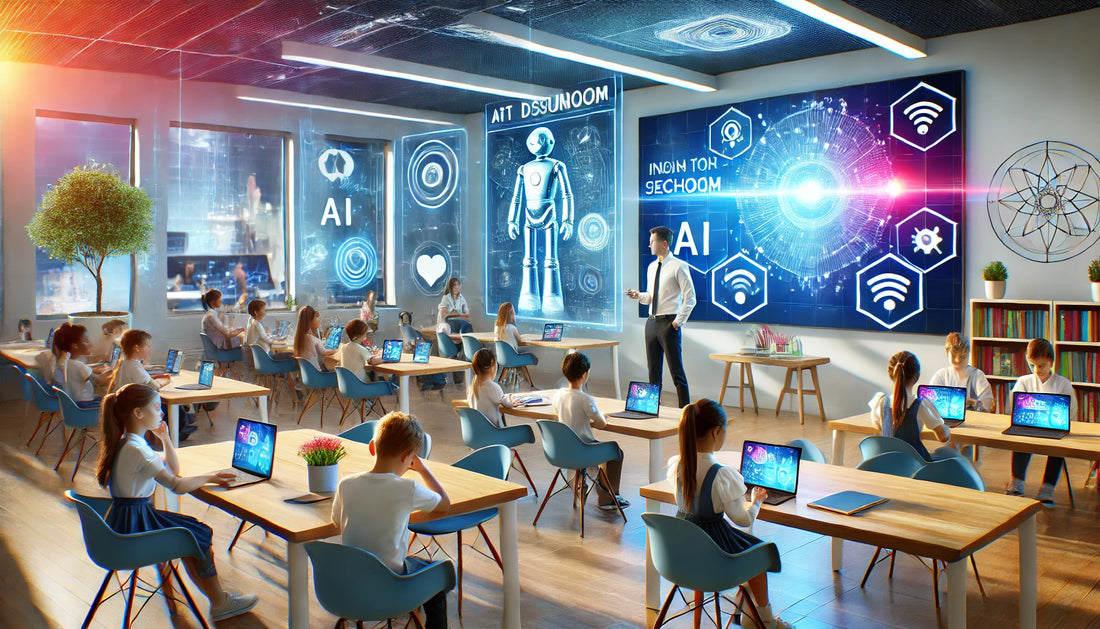
AI in the Classroom: Making Learning Smarter for Students
Share
The classroom of today looks drastically different from what many of us remember. Interactive whiteboards, online learning platforms, and virtual reality are becoming commonplace. But the most transformative technology making waves in education today is Artificial Intelligence (AI). Whether it’s personalized learning tools, automated grading systems, or AI-powered tutors, AI is reshaping the educational landscape for students, teachers, and parents alike. Let’s delve into how AI is making learning smarter and more engaging.
Personalized Learning: Tailoring Education to Individual Needs
One of AI’s most significant contributions to education is the ability to personalize learning. No two students learn the same way, and AI helps address this diversity by analyzing data to adapt to individual needs.
Adaptive Learning Platforms
AI-powered tools such as DreamBox, IXL, and Khan Academy adjust lessons based on a student’s performance. For example:
- Progress Tracking: These platforms monitor how students solve problems, identifying areas of strength and weakness.
- Customized Lessons: Based on this data, the system offers personalized practice problems, quizzes, or instructional videos tailored to the student.
This ensures that learners move at their own pace while still challenging themselves, making education more effective and enjoyable.
Special Education Support
AI is particularly beneficial for students with learning disabilities or special needs. Tools like AI-driven speech-to-text applications help students with dyslexia, while interactive apps support children with autism in improving their communication skills.
AI Tutors: Your Virtual Learning Assistant
Gone are the days when extra help meant finding a human tutor. AI tutors are now stepping in to provide 24/7 assistance.
Advantages of AI Tutors
- Availability: AI tutors, like ScribeSense or Carnegie Learning’s MATHia, are available any time of day.
- Interactive Feedback: These systems can offer instant feedback, explaining errors and suggesting improvements.
- Scalability: Unlike human tutors, AI can serve millions of students simultaneously.
For instance, platforms like Duolingo use AI to teach languages. The system adapts to the user’s proficiency level, providing tailored lessons and feedback.
Limitations of AI Tutors
AI tutors excel in providing foundational knowledge but may struggle with nuanced questions or emotional support. This is where the role of human teachers remains irreplaceable, ensuring a well-rounded education.
Streamlining Administrative Tasks for Educators
AI doesn’t just assist students—it’s also a game-changer for teachers. By automating time-consuming tasks, educators can focus more on teaching and less on paperwork.
Automated Grading
AI tools can grade multiple-choice tests, essays, and even assess writing style. Platforms like Gradescope allow teachers to save hours of work by automating grading while offering detailed analytics on class performance.
Lesson Planning Support
AI-driven tools like IBM Watson Education or TeacherAdvisor provide educators with resources tailored to their lesson plans. These platforms recommend materials based on curriculum standards, student data, and specific classroom needs.
Fostering Collaboration Through AI
AI also enhances collaboration in classrooms. Tools like Google Classroom and Microsoft Teams integrate AI features that promote teamwork:
- Real-Time Translation: AI helps students from different linguistic backgrounds collaborate seamlessly.
- Enhanced Participation: Tools like AI-driven polls and quizzes engage students in discussions, encouraging active participation.
Additionally, platforms like Otter.ai provide real-time transcription for group discussions, ensuring that no one misses out on critical insights.
Ethical Considerations: Striking a Balance
While AI’s potential in education is undeniable, it raises some ethical concerns:
- Data Privacy: AI platforms collect vast amounts of data on students. Schools and developers must prioritize secure data storage and transparent policies.
- Accessibility: Not all schools can afford advanced AI tools, potentially widening the education gap between affluent and underprivileged communities.
- Over-Reliance: While AI is an excellent supplement, it should not replace critical thinking or human interaction.
Schools must strike a balance between embracing technology and preserving the essence of human-led education.
What Does the Future Hold?
As AI continues to evolve, its role in education will only expand. Potential future innovations include:
- AI-Powered Labs: Virtual science experiments that allow students to explore safely and at their own pace.
- Emotionally Intelligent AI: Tools capable of detecting when a student feels frustrated or disengaged and adapting accordingly.
- Immersive Learning: AI-powered augmented and virtual reality experiences will make history, biology, or geography lessons come alive.
AI is revolutionizing education, offering tools that make learning more accessible, engaging, and personalized. While it’s not a silver bullet for every educational challenge, its impact is profound and far-reaching. By combining the strengths of AI with the irreplaceable qualities of human educators, we can create a smarter, more inclusive learning environment for all.


